The One Thing Your Teen Needs From You If They Are Having Sex
I just want my kids to be comfortable coming to me.

My daughter recently asked me to buy her some cranberry pills while I was at the grocery store. Because I wasn’t born yesterday — she’s a high school senior with a boyfriend — I immediately took the opportunity to ask her if she thought she had a UTI infection. She told me she didn’t, but she wanted to prevent them.
Now, that wasn’t my daughter coming to me telling me she was having sex, but I approached like it was in my calm voice. Through experience with my older child, I’ve learned the one thing a teen needs if you want them to be open with you about sex is to be accepting of their choice, whether you like it or not.
“I get UTIs from sex so make sure you always go to the bathroom after, honey, and let’s make an appointment for you to have a pap smear,” was my opener. I purposely didn’t come out and ask her if she was having sex. I worried her immediate reaction would be to tell me she wasn’t. From my experience, that makes it a lot harder for them to backtrack and admit they are if something doesn’t feel right, or they have questions. And all I want is for her to be comfortable coming to me for answers.
It took me a while to get here. When my oldest son had sex for the first time, I freaked out. He didn’t tell me he was having sex; instead, I found out one afternoon when I came home early and he was in his room with a girl I’d never met before. My reaction made him feel like he was doing something wrong, and he told me that was the very reason he didn’t even want me to know he had a girlfriend. I wasn’t prepared, and I gave him a lecture telling him he was too young. That didn’t keep him from continuing to have sex, but it did put a strain on our relationship.
I tried to backpedal because I want my kids to come to me instead of their friends to talk about sex, but it took a while. He wouldn’t talk to me about it until a few years later when he had a serious girlfriend. I decided then it wasn’t my business if he was having sex or not, and he didn’t have to tell me.
But it was my job to make sure I talked to him about consent, as well as the fact that there is no shame in having sex. I also wanted to open the conversation about STDs and make sure he knew if he ever had any new symptoms or things didn’t feel right, he needed to tell me so we could make a doctor’s appointment.
When my daughter came to me about cranberry pills, my reaction was different because of my experience with my son. I gave her space to tell me if they were or weren’t having sex if she wanted to. But it also gave her some information on UTIs and let her know that I wasn’t judging her, she wasn’t going to get in trouble, and she could come to me with any questions and I would answer them matter-of-factly.
I remember all too well when I was a teen my friends and I trying to navigate all of these things and I felt alone. In high school I had a friend drive me to Planned Parenthood and paid for an exam myself because I got a UTI so bad there was blood in my urine. I was afraid to tell my parents I was having sex and I suffered for about a month and had to scrape up the money to pay for the care I needed, even though my mother had health insurance. I never want my kids to go through that.
Lots of teenagers are going to have sex. I know my kids need to feel like their mother accepts this, accepts them, and is available without judgment. It did take me some time to learn how to do this and I still don’t do it perfectly. My kids need to be able to come to me without feeling nervous or scared. They are going to have questions, even if they are subtle, and I want to be the first person they come to.
I’m not saying I tell my kids they can bring people over and have sex, no questions asked, but I am aware teenagers are going to find time and space to have sex if they want. That might not be easy to accept, but our teens need autonomy over their bodies. And we all know from experience that parents telling you to practice abstinence isn’t very effective.
The one thing we can do as parents is to be available to them. We can talk with them (not at them) about consent and protection. We can remind them to tell us if something feels wrong physically and mentally so we can help. Teenagers should have a shame free relationship with their bodies. That’s going to be a lot harder to achieve if they feel like they are “bad” or doing something wrong that has to be kept a secret.
Diana Park is a writer who finds solitude in a good book, the ocean, and eating fast food with her kids.
This article was originally published on